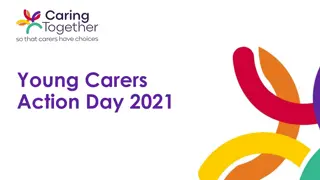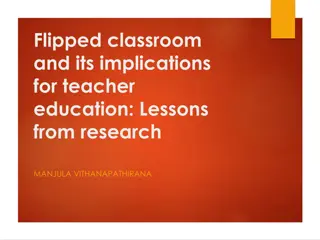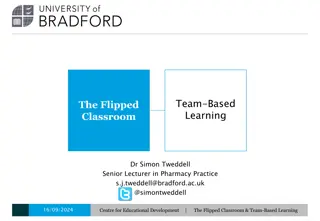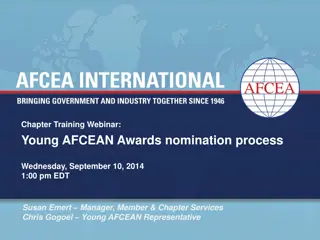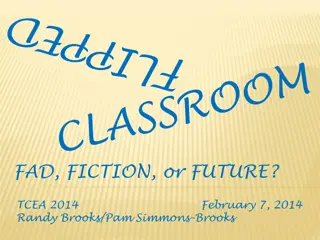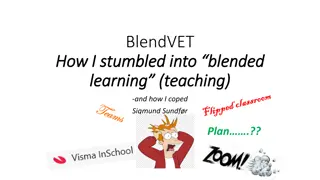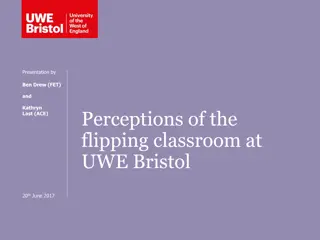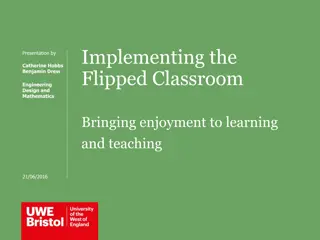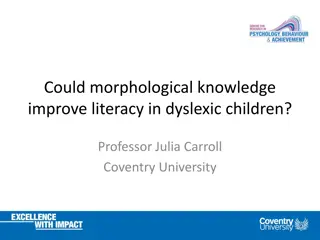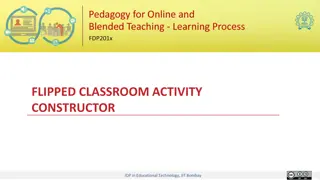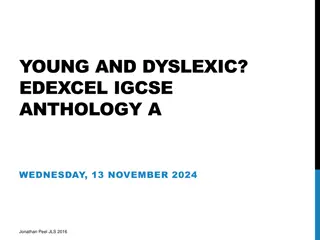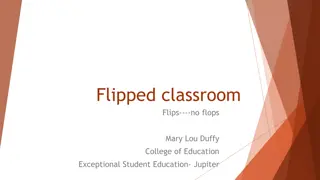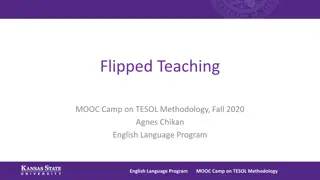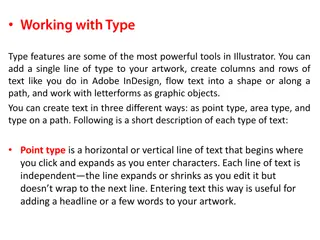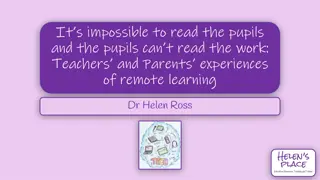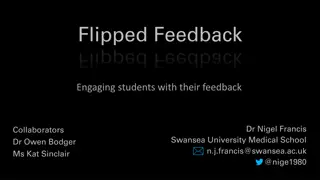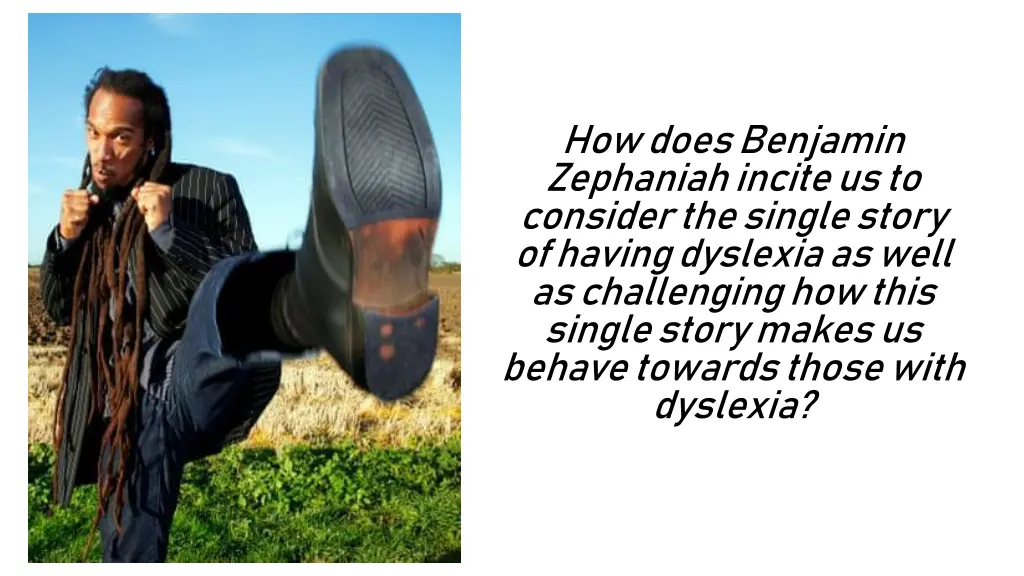
Benjamin Zephaniah's Insight on Dyslexia Perception and Behavior
Explore how Benjamin Zephaniah challenges the single story of dyslexia by sharing his personal experiences and encounters with rigid educational systems. Discover how his narrative incites us to reconsider our perspectives and behaviors towards individuals with dyslexia, encouraging a more empathetic and understanding approach.
Download Presentation

Please find below an Image/Link to download the presentation.
The content on the website is provided AS IS for your information and personal use only. It may not be sold, licensed, or shared on other websites without obtaining consent from the author. If you encounter any issues during the download, it is possible that the publisher has removed the file from their server.
You are allowed to download the files provided on this website for personal or commercial use, subject to the condition that they are used lawfully. All files are the property of their respective owners.
The content on the website is provided AS IS for your information and personal use only. It may not be sold, licensed, or shared on other websites without obtaining consent from the author.
E N D
Presentation Transcript
How does Benjamin Zephaniah incite us to consider the single story of having dyslexia as well as challenging how this single story makes us behave towards those with dyslexia?
Benjamin Zephaniah. Benjamin Zephaniah. Benjamin Zephaniah was born in Birmingham in 1958, to parents from Barbados and Jamaica. He left school at 13, unable to read and write, due to his dyslexia. After drifting into petty crime, he decided to move to London at the age of 22 and concentrate upon his poetry, after learning to read at adult education classes. He published his first collection of poems in 1980, and since then has released a number of poetry collections, recordings and novels. He has received honorary degrees from a number of Universities (including Birmingham, Exeter and the University of Central England).
The single story is a narrow perspective (as seen in The Danger of a Single Story) To incite means tostirup orcall to action (cobuild) to make people think or encourage them to take action in response to something. How does Benjamin Zephaniah incite us to consider the single story of having dyslexia as well as challenging how this single story makes us behave towards those with dyslexia? Challenging immediately conveys a purpose of wanting to change people s viewpoint Dyslexia is a disorders that involves difficulty in learning to read or interpret words, letters, and other symbols.
1. Firstly, we are presented with the rigidness of education that leads to a lack of space for dyslexia Declarative sentence I was just being creative implying he didn t see it as problematic when the teachers did. Adjective creative suggests that he doesn t see his answer as wrong, more different and perceptive Declarative sentence At school my ideas always contradicted the teachers statement shows a recognition for thinking differently to the teachers. Adverb always implies this happened all of the time. Verb contradicted suggesting he thought the opposite to the teachers. 10 11 12 13 14 15 At school my ideas always contradicted the teachers . I remember one teacher saying that human beings sleep for one-third of their life and I put my hand up and said If there s a God isn t that a design fault? If you ve built something, you want efficiency. If I was God I would have designed sleep so we could stay awake. Then good people could do one-third more good in the world. 16 17 18 19 The teacher said Shut up, stupid boy. Bad people would do one-third more bad. I thought I d put in a good idea. I was just being creative. She also had a point, but the thing was, she called me stupid for even thinking about it. Interrogative in direct speech How dare you challenge me? suggesting she was uncomfortable with his thinking as it didn t align with hers and thought him rude and impertinent. 20 21 22 I remember a teacher talking about Africa and the local savages and I would say, Who are you to talk about savages? She would say, How dare you challenge me? and that would get me into trouble. Adjective stupid instead of recognizing his answer and considering it, because it wasn t the answer she wanted to hear, she saw it as wrong.
2. We are presented with the perception that dyslexia and intelligence are linked, which is incorrect. Direct speech / anecdote: We can t all be intelligent, but you ll end up being a good sportsperson the teacher is suggesting a lack of intelligence because he does not understand that he is dyslexic. His utterance presents a limited viewpoint on what he thinks Zephaniah can achieve in his life 23 24 25 26 27 Once, when I was finding it difficult to engage with writing and had asked for some help, a teacher said, It s all right. We can t all be intelligent, but you ll end up being a good sportsperson, so why don t you go outside and play some football? I thought, Oh great, but now I realise he was stereotyping me. Verb stereotyping Suggests that he is simply categorizing him rather than working to understand his thinking or his disorder
3. Ultimately the way we view dyslexia is down to a lack of understanding. Tricolon: no compassion, no understanding and no humanity use of tricolon effectively conveys a lack of warmth and support for him throughout his education. No sympathy, no attempt at a diagnosis or trying to find out more, no caring treatment. He just felt dismissed. Verb phrase: didn t know presenting the idea that there was a real lack of knowledge about dyslexia at the time 3 4 5 6 7 8 9 I m of the generation where teachers didn t know what dyslexia was. The big problem with the education system then was that there was no compassion, no understanding and no humanity. I don t look back and feel angry with my teachers. The ones who wanted to have an individual approach weren t allowed to. The idea of being kind and thoughtful and listening to problems just wasn t done: the past is a different kind of country. Noun: problem implies that the education system was faulty because he was not supported or helped. Declarative sentence: The idea of being kind and thoughtful and listening to problems just wasn t done: the past is a different kind of country Adjectives: kind , thoughtful and verb listening to reinforces the lack of compassion he felt towards him. Colon introduces a potential shift. Clause: the past is a different kind of country perhaps indicates that things have changed and young people no longer suffer in the same way.implies that the education system was faulty because he was not supported or helped.
4. Even he did not understand that he had dyslexia Rhetorical question: Do I need an operation? shows complete lack of awareness about dyslexia and what it means to have dyslexia 62 63 64 65 At 21, I went to an adult education class in London to learn to read and write. The teacher told me, You are dyslexic, and I was like, Do I need an operation? She explained to me what it meant and I suddenly thought, Ah, I get it, I thought I was going crazy. Declarative statement: I thought I was going crazy conveys the struggles he has faced as a result of not know what dyslexia is or that he had it. Adjective crazy reinforces his lack of understanding and his dismissal of gaining an understanding
5. Because of the lack of support potentially there is a correlation between dyslexia and people in prison. Noun phrase: high percentage provides a vague statistical link between the prison population and dyslexia Prepositional phrase: on top of this, dyslexic makes it seem as though having dyslexia is a barrier 43 44 45 46 47 48 49 A high percentage of the prison population are dyslexic, and a high percentage of the architect population. If you look at the statistics, I should be in prison: a black man brought up on the wrong side of town whose family fell apart, in trouble with the police when I was a kid, unable to read and write, with no qualifications and, on top of this, dyslexic. But I think staying out of prison is about conquering your fears and finding your path in life. When I go into prisons to talk to people I see men and women who, in intelligence and other qualities, are the same as me. But opportunities opened for me and they missed theirs, didn t notice them or didn t take them. 50 51 52 53 Clause: I see men and women, who in intelligence and other qualities, are the same as me Verb phrase: I see importance of seeing people for who they are and their potential, rather than their disabilities . Noun intelligence reinforcing that there is no link between dyslexia and intelligence. phrase: the same as me empathetic, illustrating similarities and differences between him and those in prison before reinforcing that the difference is taking up opportunity.
6. Zephaniah recognizes the limited view towards people with dyslexia and rejects it Short declarative sentence: I never thought I was stupid doesn t accept the label or perception. Adverb never implies that not once has he listened to how others define him without understanding him. Adjective stupid he rejects the label. 54 55 56 57 I never thought I was stupid. I didn t have that struggle. If I have someone in front of me who doesn t have a problem reading and writing telling me that black people are savages I just think, I m not stupid you re the one who s stupid. I just had self-belief. Short declarative sentence: I just had self-belief doesn t accept the label or perception. Arguably puts forward that disregarding what others think is more important. Adverb phrase just had implies that he never listened to anyone else and focused on his own thoughts and beliefs. Compound noun self-belief he thinks positively about who he is and what he has to offer
7. Instead Zephaniah seeks to educate people about how he learnt to live with his dyslexia. Declarative sentence: I told my poems to my girlfriend, who wrote them down for me He asks his girlfriend to do the writing for him. Verbs told and write really illustrate the adaptation to the process. Adverbial phrase for me reinforces that the gfriend becomes his writer Anecdotes: Zephaniah provides a range of anecdotes to illustrate how he has learnt to accommodate his dyslexia through his life. 58 59 60 61 For my first book I told my poems to my girlfriend, who wrote them down for me. It really took off, especially within the black community. I wrote wid luv for with love, People didn t think they were dyslexic poems, they just thought I wrote phonetically. 62 63 64 65 At 21, I went to an adult education class in London to learn to read and write. The teacher told me, You are dyslexic, and I was like, Do I need an operation? She explained to me what it meant and I suddenly thought, Ah, I get it, I thought I was going crazy. 66 67 68 69 70 71 I wrote more poetry, novels for teenagers, plays, other books and recorded music. I take poetry to people who do not read poetry. Still now, when I m writing the word know , I have to stop and think, How do I write that? I have to draw something to let me know what the word is to come back to it later. If I can t spell question I just put a question mark and come back to it later. Declarative sentence: At 21, I went to an adult education class in London to learn to read and write He proactively seeks to address the barrier that has hindered him previously. Adverbial phrase At 21 decisive action being taken. Verb learn he has decided to tackle his dyslexia head on. Conversational tone: Still now, when I m writing the word know It is like he is talking to a friend who is trying to reassure and support. Hypophora How do I write that? I have to draw something poses the questions other dyslexics might have and suggests a solution. Conditional sentence If I can t spell question, I just provides a scenario for the reader before offering a solution or way of overcoming.
8. Zephaniah encourages people to have self-belief and view being dyslexic in a different way. Parallel structure: We are we are Metaphor: architects , designers creative thinkers and builders. A position within society. A responsibility. Verb: suffered he recognizes having dyslexia has been hard. Conjunction: but however Noun: advantage he chooses to see it differently and positively. Adverb creatively he recognizes his creativity. 1 2 As a child I suffered, but learned to turn dyslexia to my advantage, to see the world more creatively. We are the architects, we are the designers. 87 88 89 If you re dyslexic and you feel there s something holding you back, just remember: it s not you. In many ways being dyslexic is a natural way to be. Adjective: natural argues that having dyslexia is normal. Imperatives: just remember: it s not you offers advice to encourage people with dyslexia to realise they are not the problem. People who judge them wrongly, are.
How does Benjamin Zephaniah incite us to consider the single story of having dyslexia as well as challenging how this single story makes us behave towards those with dyslexia?


